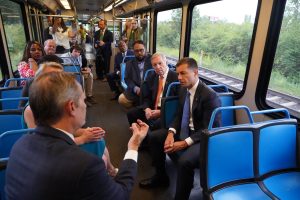Metro Transit gets flood-recovery grant
By Kevin Beese Staff Writer — August 8, 2023
Taulby Roach (left), president and CEO of Bi-State Development, which oversees the Metro Transit system, speaks July 31 with U.S. Secretary of Transportation Pete Buttigieg onboard a MetroLink train traveling in St. Clair County. Buttigieg was on hand to announce $28 million in emergency federal funding for Metro Transit recovery from last summer’s flash floods. (Metro Transit photo)
Metro Transit will be getting $27.6 million in federal emergency disaster relief funding for recovery efforts from last summer’s flash flooding.
U.S. Secretary of Transportation Pete Buttigieg gathered with federal, state and local leaders from Illinois and Missouri in East St. Louis on July 31 to announce the emergency funding.
“After the record rainfall and flash flooding in July 2022, we turned to our federal partners at the (U.S.
Department of Transportation) and (Federal Transit Authority) as well as our friends in Congress for help,” said Taulby Roach, president and CEO of Bi-State Development, which operates the Metro Transit system. “Their support at the time was so appreciated and continues to be even more important now a year later as we continue to recover from that devastating weather event.”
Metro Transit covers St. Clair County, and St. Louis and St. Louis County in Missouri.
Joining Buttigieg in announcing the federal funding were U.S. Senate Majority Whip Dick Durbin, D-IL, and U.S. Sen. Tammy Duckworth, D-IL, and U.S. Rep. Nikki Budzinski, D-13th.
The flooding caused two fatalities and damaged the transit system, destroying rail vehicles, two station elevators and a signal house. The flooding also damaged five miles of light rail track bed and communications, signal and fiber optics systems housed in two communications rooms and four signal houses.
“Last summer, the Metro East tragically experienced severe flooding that destroyed essential components of the public transit system that Illinoisans rely on to travel around the St. Louis region,” Durbin said. “I fought to ensure that MetroLink would have access to the necessary federal emergency relief funding to rebuild and continue to serve its riders.
“I’m grateful that my colleagues and my efforts yielded $28 million in federal funding to address the damages. With this federal support, MetroLink will bounce back.”
Duckworth said the severe storms and flooding over the last few years in the Metro East area have devastated many families and communities, and had a huge impact on the local economy.
“Today’s funding is critical in helping the region recover from capital and operating losses incurred by years of extreme weather,” Duckworth said. “I will continue working alongside Senator Durbin to help bring the necessary federal resources like this back to Illinois to restore affected communities and revive local economies.”
“The Bipartisan Infrastructure Law isn’t just rebuilding our roads and bridges, it’s helping communities recover from disasters and investing in the future of our economy and our environment,” Budzinski said.
She noted the $28 million is on top of $196 million secured for new rail cars on the transit system.
That $196 million will be used for the replacement of light rail vehicles that have exceeded or are near the end of their useful life, which is 25 years old. Thirty of the 86 light rail train cars in the MetroLink fleet are 30 years old and all 86 cars have more than 1 million miles logged on each of them, with 16 cars having 2 million miles on each of them.
“Together, these funds will help pave the way for faster, safer, more efficient travel for passengers while promoting resiliency in the face of future extreme weather,” Budzinski said.
Durbin noted that he pushed for the emergency relief funding, securing FTA funding for MetroLink in the fiscal year 2023 omnibus appropriations bill that passed Congress in December.
Secretary Buttigieg said that events like the MetroLink flooding last summer are an all-too-familiar story these days.
“It feels like every week, we are hearing about a new flood or storm or drought or wildfire or heatwave or other extreme event, and since we are seeing this with our own eyes, we know, as leaders, our duty includes doing something about it,” Buttigieg said. “In terms of our transportation work, that means supporting recovery and rebuilding efforts and it means ensuring that our infrastructure is built to withstand the extreme weather that is coming more frequently.”







